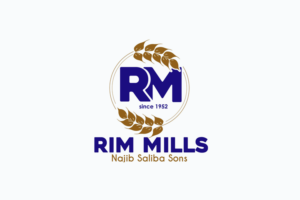Rim Mills is one of the biggest non-conventional wheat mills in the Bekaa region, modernizing its mills to focus on producing burghul and moghrabieh also known as “The Lebanese Pearl”.
DID YOU KNOW?
Rim Mills is equipped with a modern factory, capable of meeting local and international demand. They developed a process to increase their social impact, focusing on a cluster of farmers in the region, willing to grow specific wheat, where they not only commit to buying the yield but also help the farmers in good farming practices.
Rim Mills aspires to impact the wheat value chain vertically and horizontally by innovating with new products that match international consumers’ needs and by reaching out to international markets where the Lebanese produce is seen highly. To do so, Rim Mills has established Berdwani, a logistic and distribution arm that built the Golden Son brand. Currently, Berdawni is focusing on identifying new markets where the Lebanese Pearl, moghrabieh, can be a good market fit.
Some interesting facts on Rim Mills, it was the first fully automatic burghul factory in Lebanon, FDA approved, built a legacy through preserving a direct relationship with the farmers, supporting them, helping them to exploit their lands, and maintained the traditional Agri-food industry methods with modern international standards.
WHAT’S THE INNOVATION?
Rim Mills innovation is built on three steppingstones, the family’s vision in preserving the legacy left by the ancestors, the conviction that modernization is an imperative path towards success, and the social impact Rim Mills is trying to achieve.
Rim Mills’s innovation resides in developing and improving the production of wheat-based products locally by adopting a holistic approach. It aims to secure local supply/export substitution of raw materials, identify international markets to secure demand, and introduce cutting-edge automated machinery that can meet the supply/demand challenges.
WHAT’S THE STORY BEHIND THE INNOVATION?
Rim Mills started in 1952 with Najib Diab Saliba, the grandfather, using very conventional methods in brewing burghul manually and drying crushed boiled Wheat under the sun on the rooftops of houses. At a certain point, all the rooftops of the industrial zahleh zone were occupied by mills, during their production. Najib was supported by his four sons, and currently, his grandson Najib took charge and decided to modernize the production while preserving the legacy that his grandfather built.
Rim Mills had the vision to make the production of burghul and mograbieh accessible to the Lebanese community and Arabs worldwide with the purpose of increasing the local production, elevating the quality of the crop produced, and helping the local community of Zahleh. Rim Mills aims to preserve the legacy of its ancestors by making wheat-based products, essential by nature, and easily accessible.
WHY IS IT IMPORTANT?
Lebanon depends on importing wheat, whether for flour production or for other wheat-based products. Up-scaling Rim Mills factory for burghul production and moghrabieh, will provide a mean for the farmers to grow more wheat and exploit their lands. The innovation’s importance is the linkage, Rim Mills is providing, between the farmers and the international markets requesting “Grade A” wheat-based products.
WHO IS BENEFITTING?
Three main stakeholders are benefiting from the innovation. The farmers, who are investing in their lands, growing a commodity, and making wheat more accessible. The local consumer, purchasing wheat-based products at an acceptable price. And the local community of Zahleh / Kaa El Rim developing micro-economies around Rim Mills’ operations. Rim Mills is being rewarded for its innovation which will create more job opportunities.



